Jump to Directions
We stopped using commercial bug sprays from the grocery store many years ago. We’ve tried some natural bug sprays, but it’s so easy to make your own Homemade Bug Spray that there’s no reason to buy it.
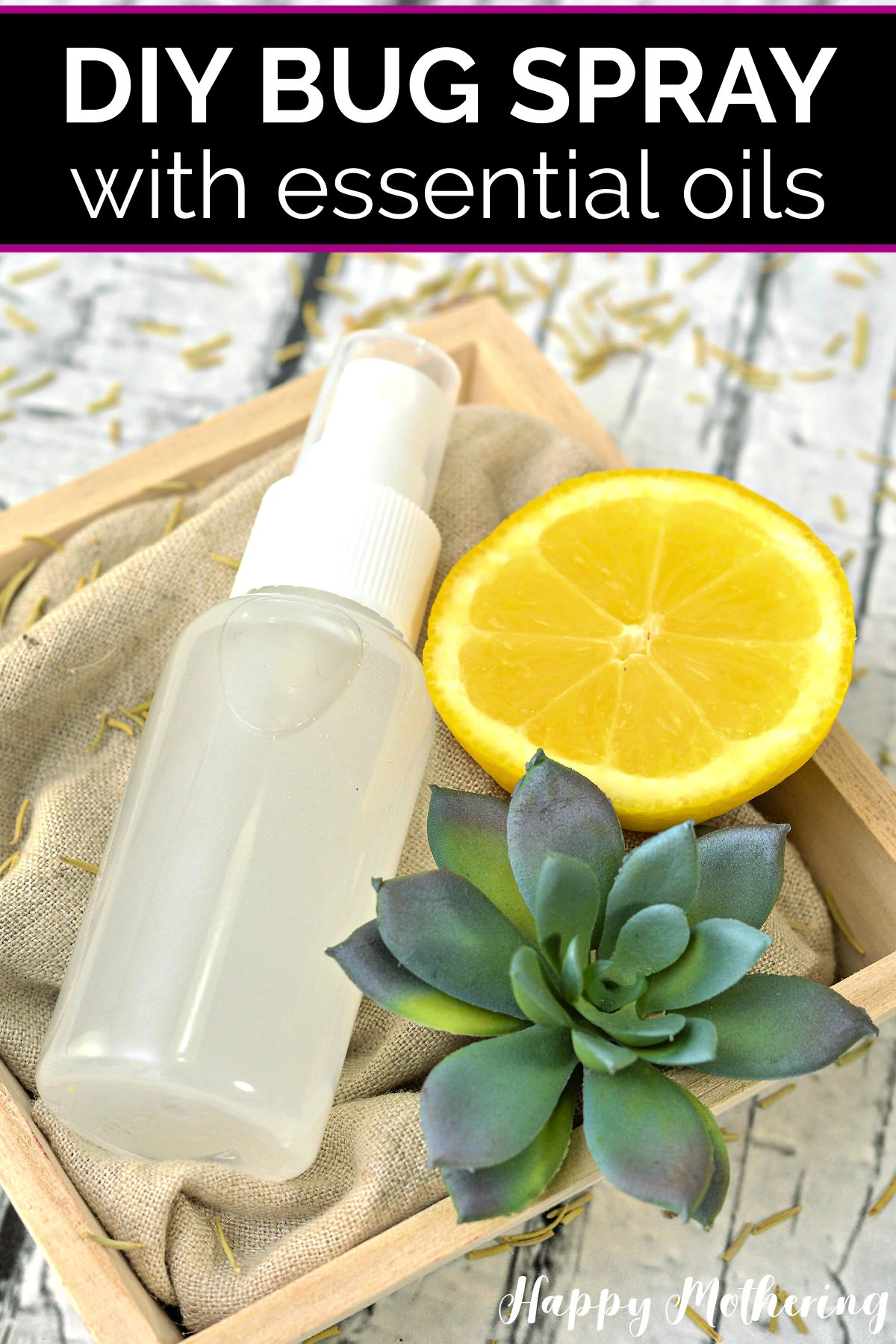
If you have young children who enjoy spending lots of time outdoors during the long days of summer, the last thing you want to worry about is mosquito bites and other insect bites. The good news is that it’s easy to make an effective insect repellent without harmful chemicals so your family can enjoy the warm weather.
My essential oil bug spray recipe uses only simple ingredients with 3 different essential oils – eucalyptus, rosemary and lemon. I love how these oils smell when combined, and they all have wonderful properties for keeping pesky bugs at bay.
If you’ve been wanting to make your own bug spray for a long time, give this natural bug repellent recipe a try. It’s great for daily use and is a safe alternative to chemical repellents for sensitive skin.
- Supplies and Tools
- By the Numbers: How to Make Essential Oil Bug Repellent
- Tips for Making & Using Homemade Bug Spray
- 1. What types of bugs is this good for?
- 2. How to use bug spray?
- 3. What’s the purpose of each essential oil?
- 4. Other effective essential oils to try?
- 5. Doesn’t a carrier oil need to be used?
- 6. Alternative to grain alcohol?
- 7. Essential oils for bug bites?
- 8. Other DIY beauty products for summer?
- 9. Buy Natural Insect Repellent
- Homemade Bug Spray with Essential Oils
- More Essential Oil Tutorials
Supplies and Tools
- 1 ounce of high proof grain alcohol
- 45 drops of eucalyptus essential oil
- 40 drops of rosemary essential oil
- 20 drops of lemon essential oil
- 3 ounces of distilled water
- Small funnel
- 4-ounce glass spray bottle
By the Numbers: How to Make Essential Oil Bug Repellent
Follow these simple steps to learn how to make your own DIY bug spray with a handful of natural ingredients.
Step 1: Add Alcohol to Bottle.
Add one ounce of high proof grain alcohol, like 91% Everclear, to your glass spray bottle.
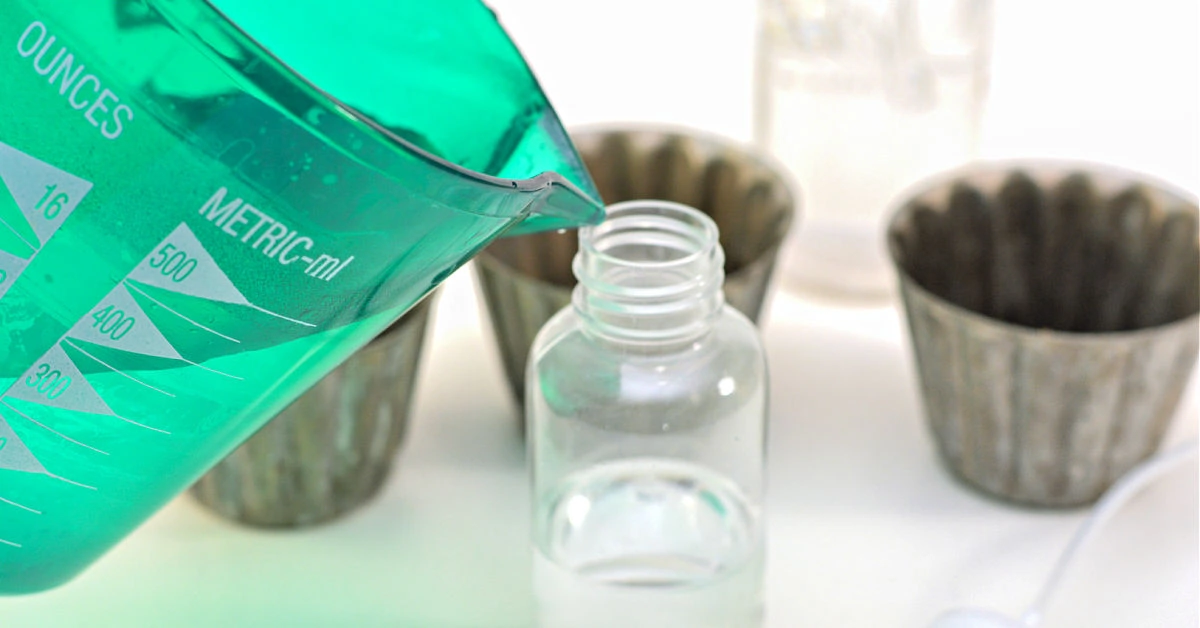
Step 2: Add Essential Oils to Bottle.
Carefully add 45 drops of eucalyptus essential oil, 40 drops of Rosemary essential oil and 20 drops of lemon essential oil to the bottle and allow the oils to dissolve into the alcohol. It can take up to an hour, so it’s best to let it sit and come back.
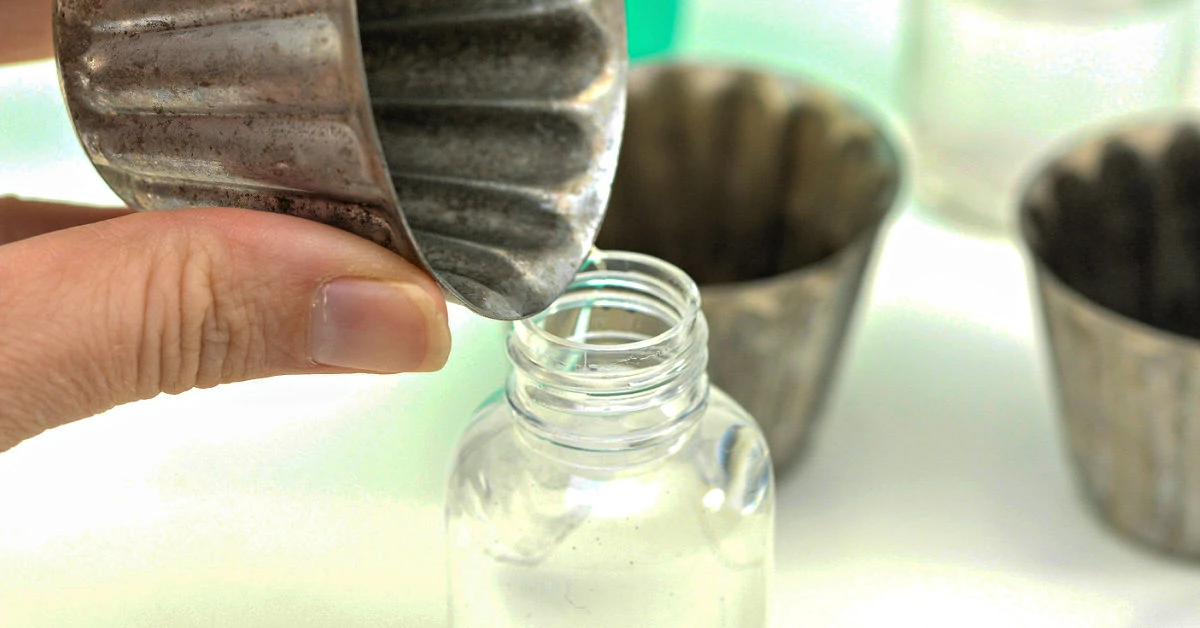
Step 3: Add Water to Bottle.
Once the essential oils are solubilized (dissolved), you can top off your glass spray bottle with distilled water. You’ll use about a teaspoon less than 3 ounces.
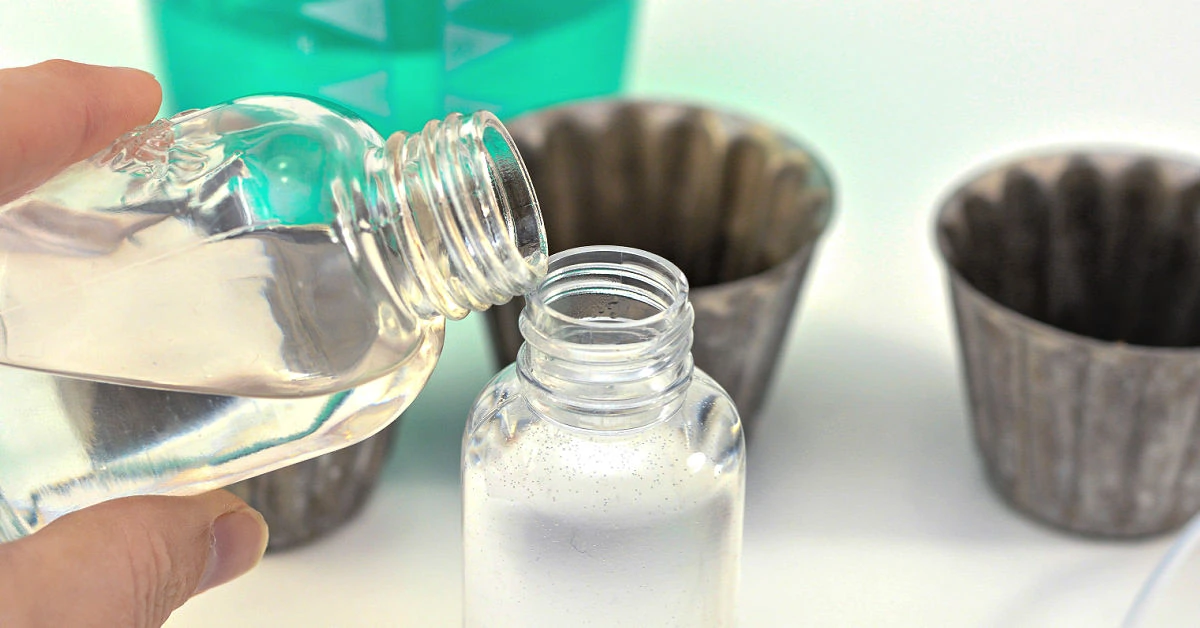
Step 4: Cap and Shake Bottle.
Place the lid on the spray bottle, give it a shake and it’s ready to use.
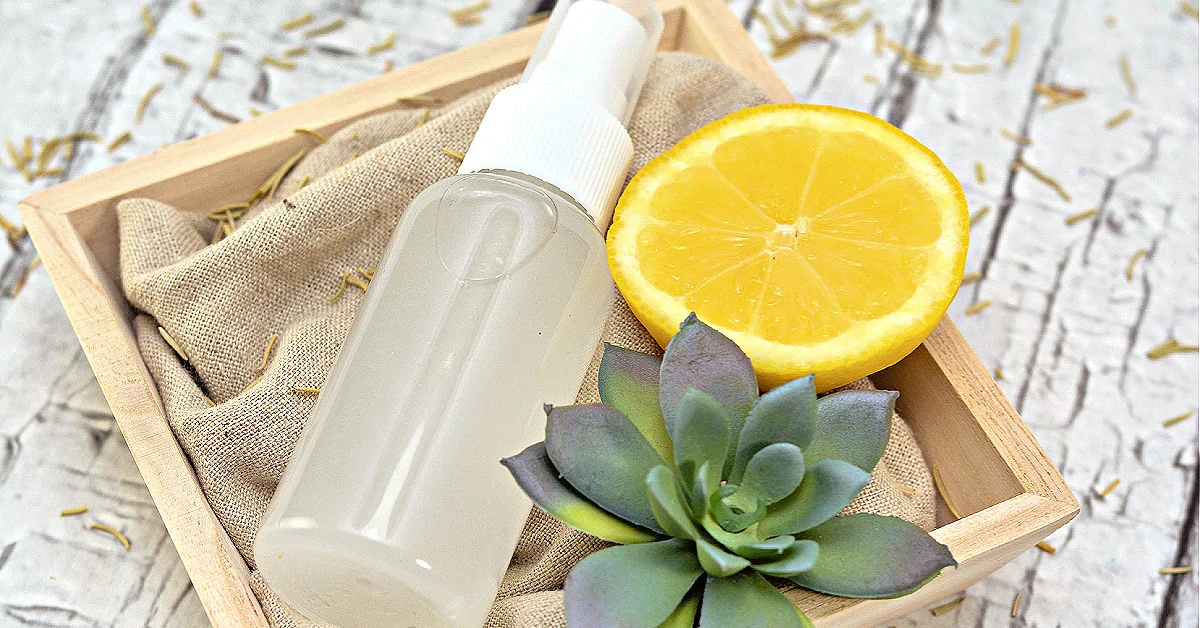
Tips for Making & Using Homemade Bug Spray
Answers to all of your questions about making your own natural insect repellent spray at home.
1. What types of bugs is this good for?
This natural insect repelling spray makes a good mosquito repellent, but it can also work well for lots of other creepy bugs like spiders, flies, spider mites, gnats, and more.
2. How to use bug spray?
The ingredients should stay combined in this recipe. However, for best results and variations in preparation, give the bottle a good shake before each use just to make sure everything is well combined. Mist the mixture onto your skin wherever you wish to protect yourself from biting insects and bugs.
Just beware that citrus oils cause photosensitivity, so you don’t want to use lemon oil on skin that will be exposed to the sun. So, it’s best to use this oil under clothing or when the sun has set. If you want to substitute another oil for the lemon, keep reading.
Like all essential oil-based products, you should not use this natural homemade bug spray near mucous membranes. If you notice any skin irritation, discontinue use.
3. What’s the purpose of each essential oil?
I used 3 essential oils in this recipe that I find smell great together and work well for my family. Here are the reasons (besides scent) that I chose them:
- Eucalyptus essential oil is great for repelling mosquitoes and other biting insects. Plus is smells really refreshing.
- Rosemary essential oil acts as a repellent scent for many different bugs, including mosquitoes, black flies and moths. This wonderful oil helps to keep the biting bugs away from your family when you use it in this natural DIY bug spray.
Bonus tip: rosemary plants themselves can be useful for keeping pesky bugs away from the crops growing in your vegetable garden. Read more tips on using essential oils in your garden. - Lemon essential oil is another natural pest deterrent. It can even help keep spiders away, which makes it great on a camping trip. Plus lemon is one of the more affordable oils, so everyone should have a bottle.
4. Other effective essential oils to try?
If you want to use different oils from the ones listed in the recipe, there is long list of essential oils that have insect repelling properties. You can experiment with various oils to find a blend that not only smells amazing to you, but works great in your area too.
This homemade bug repellent recipe calls for a total of 105 drops of essential oil for a 4-ounce bottle, which is about a 3% concentration. So just stick with that number of drops (or less) when experimenting with blends.
- Cedarwood oil. You’ve probably heard of cedar closets and cedar hangers for repelling moths. That same concept works for repelling them with the oil itself.
- Cinnamon oil. This powerful oil not only repels mosquitoes but has been shown in studies to kill them and their eggs eggs as well.
- Citronella oil. You’ve probably heard of citronella candles being used as a natural mosquito repellent, but the oil on its own can also be used in bug sprays and balms.
- Lavender oil. While I personally think lavender smells amazing, the scent has also been shown to repel mosquitos in one study along with rosemary, eucalyptus and thyme oil.
- Lemon Eucalyptus oil. While not quite as effective as DEET, Lemon Eucalyptus essential oil (eucalyptus citriodora) is shown to be an effective mosquito repellent when used at a higher concentration (32%). While I would not spray a concentration of essential oils that high directly onto my skin, it could be used on clothing and other items that have been tested for color fastness.
- Lemongrass oil. Along with many other essential oils, Lemongrass has been shown to repel insects.
- Neem oil. This oil provides some repelling properties, but not as much as other options according to this study. Additionally, most neem oil is a blend of ingredients rather than pure neem.
- Peppermint oil. A member of the mint family, Peppermint is a good bug repellent because bugs, including spiders, hate the smell of peppermint. The scent does fade quickly though, so frequent reapplication is needed.
- Tea tree oil. Also called Melaleuca, tea tree oil has been show in field studies to help repel not only mosquitoes, but also bush flies and biting midges.
- Vanilla extract. When I first read this one, I didn’t believe it. However, you can mix vanilla extract with water, and it’ll actually repel bugs. The bonus is that you’ll smell like a bakery.
As you can see, there are a ton of options, so the best essential oils to choose will be the ones that stand out to you.
If you don’t have favorite oils and want to mix up your own blends, Rocky Mountain Oils has a pre-made blend called Bug Away that’s packed with powerful essential oils for dealing with pests. It includes a blend of pure essential oils, including Citronella, Cedarwood Atlas, Lavender, Lemongrass, and Thyme… all oils that are wonderful for natural bug repellents!
If that blend doesn’t resonate with you, Mountain Rose Herbs also has a blend called Bug Blend. The essential oils used include Virginia cedarwood, lemongrass, rosemary, geranium, spearmint and thyme. So it’ll have a totally different scent and may work on different bugs than the RMO blend.
5. Doesn’t a carrier oil need to be used?
That’s a great question. I do use a carrier oil like fractionated coconut oil or jojoba oil with nearly every essential oil project I make.
However, you can also use alcohol to solubilize essential oils to make sprays. Solubilizing essential oils in high proof alcohol is considered a safe practice for diluting them, according to The Tisserand Institute. Instead of diluting them, you’re dissolving them.
6. Alternative to grain alcohol?
The safest alcohol to solubilize essential oils is 91% grain alcohol like Everclear. If you want to use something different, consider that you need at least 60% alcohol (120 proof) in order to preserve the mixture, and at least 75% alcohol (150 proof) in order to solubilize essential oils.
That said, you can use 75% grain alcohol, but it may not fully solubilize all essential oils, so make sure you’re not choosing thicker oils (like Myrrh). Rubbing alcohol isn’t considered high enough proof to use diluted, and must be used undiluted, which can cause skin irritation.
You’ve probably seen homemade bug spray recipes that use water, apple cider vinegar or witch hazel as the base ingredient. That is not considered a safe way to dilute, solubilize or preserve essential oils, and since they’re all water-based, they can contribute to microbial growth so I recommend skipping those recipes.
7. Essential oils for bug bites?
If you forgot your insect repellent spray and have bug bites that need soothing, try my DIY Itch Relief Balm. It helps take the sting out of the bites.
8. Other DIY beauty products for summer?
The summer months are one of the best times to use your essential oils in homemade beauty products. Some of my favorite DIY projects include:
9. Buy Natural Insect Repellent
If you’d rather buy than DIY, Mountain Rose Herbs has a Don’t Bug Me! Bug Off Stick that’s essential oil based and works great!
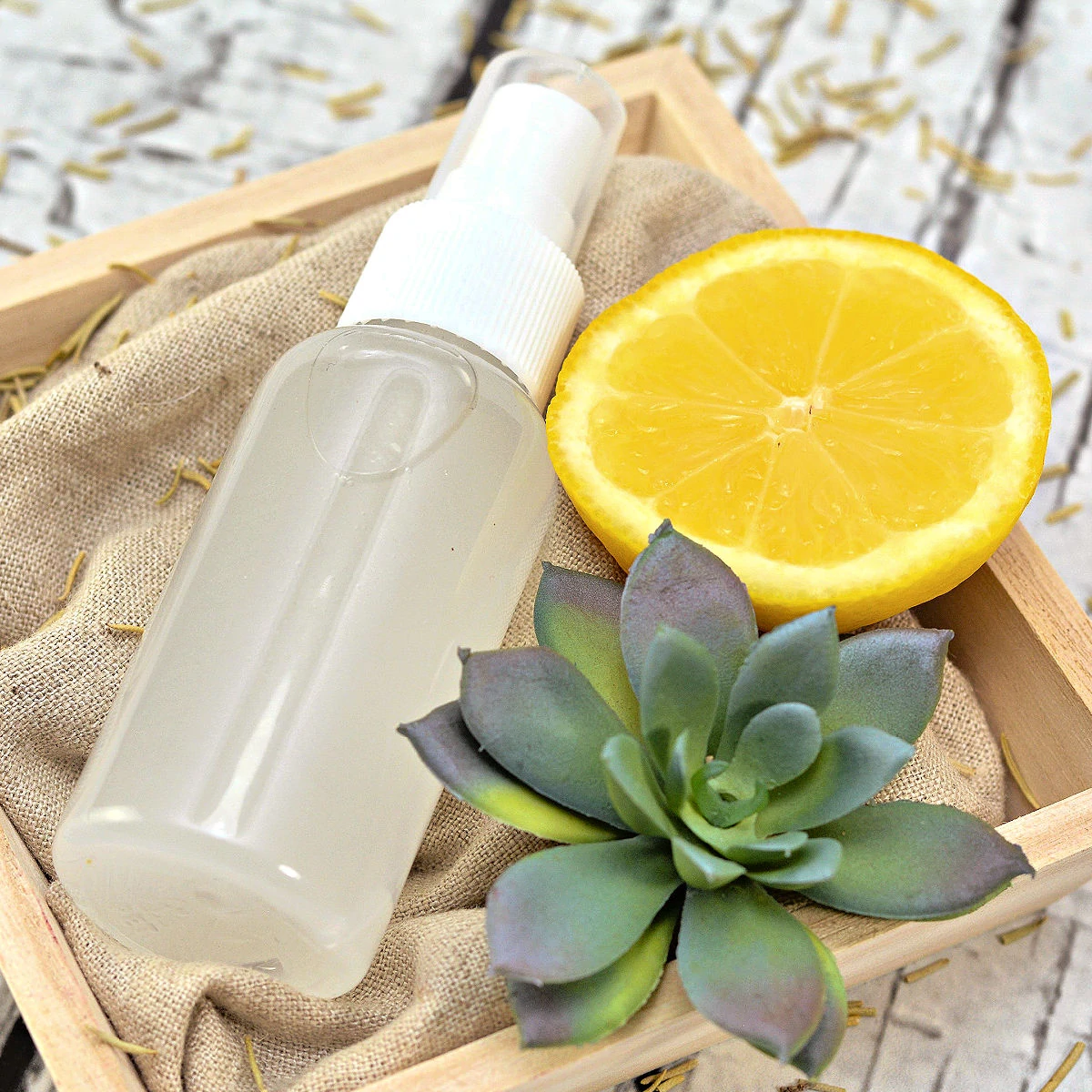
Homemade Bug Spray with Essential Oils
Supplies
- 1 ounce high proof grain alcohol - like Everclear
- 45 drops eucalyptus essential oil
- 40 drops rosemary essential oil
- 20 drops lemon essential oil
- 3 ounces distilled water - minus one teaspoon
Tools
- 4 ounce glass spray bottle
- Small funnel
Instructions
- Add the grain alcohol to your glass spray bottle.
- Add essential oils to the grain alcohol, and allow them to sit for about an hour to solubolize.
- Top off the bottle with about a teaspoon less than 3 ounces of distilled water.
- Place the lid on the spray bottle, shake well and use.

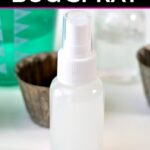
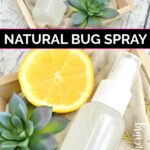
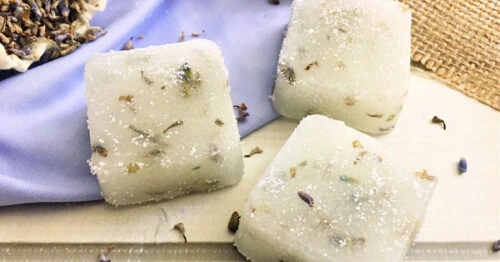
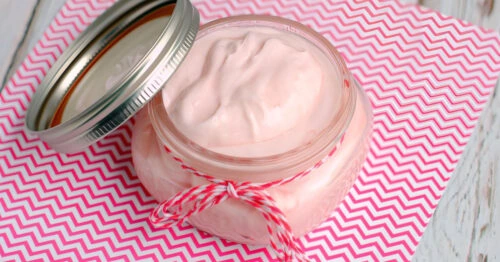
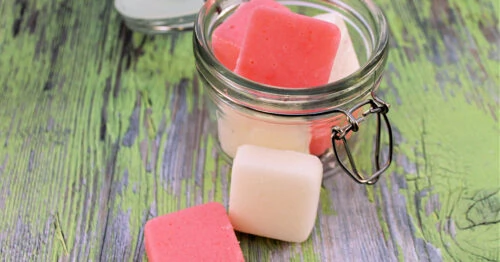
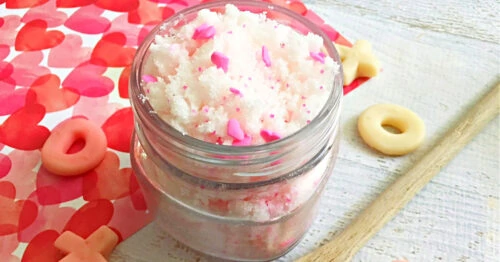
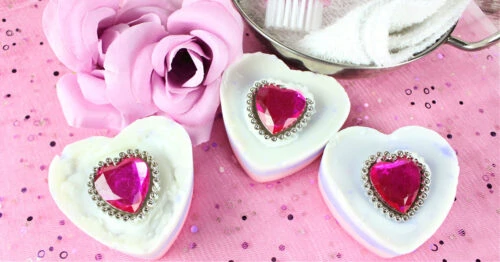
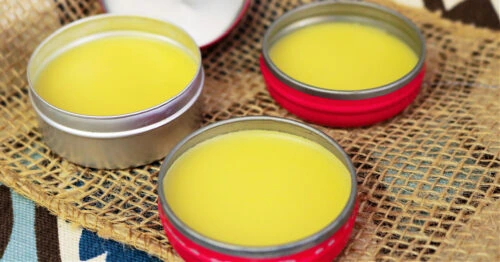
Hey, and many thanks for sharing your recipe. Can I use any essential oil brand?
Hi Karen, you can use any essential oil brand you like. However, some brands are better quality than others so you’ll have to test the effectiveness if you want to use something of a lower quality than Rocky Mountain Essential Oils.
Thank you Chrystal for promoting a safer and healthier alternative to commercial bug repellents. Your homemade bug spray using essential oils is a wonderful option for those seeking natural solutions for bug protection.